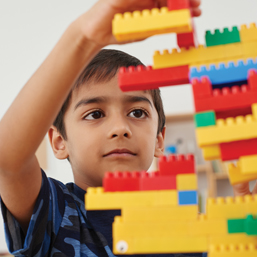
Every parent wants their children to be successful in life, but how can you ensure that happens? How can you be sure your children reach their full potential? Part of the equation is found in teaching basic behaviors and attitudes called executive function or more simply put, life skills.
Ellen Galinsky has done extensive research on the skills children need to master in their early years to become successful all through life. Her book, Mind in the Making, explores the ways children learn and incorporate life skills into their daily routines. Galinsky organized these skills into seven basic areas: focus and self-control, perspective-taking, communicating, making connections, critical-thinking, taking on challenges, and self-directed, engaged learning. Each life skill is an important part of being a kind, caring, and successful human being. Each skill is necessary to be a lifelong learner.
Life skills must be modeled and taught. While some children seem to learn these skills more easily than others, the skills don’t just ‘happen.’ Children who learn these skills are better adjusted and more successful in all areas of life, especially in an academic setting. These skills begin to be learned in early childhood and continue to be honed throughout young adulthood.
Let’s tackle the first life skill: Focus and self-control
Our world is filled with distractions and information overload. To engage in learning, children must be able to intentionally focus attention, screen out noise and other distractions, pay attention at the right times, and remember rules and directions. That’s a lot to expect of a child.
There are four main components to focus and self-control:
1. Focus - The ability to remain alert, direct attention, concentrate on a goal, break the problem down into steps and keep moving toward the goal. We all know people who always seem to become distracted or who focus on the wrong information at the wrong time. Focus is key to gathering necessary information and staying with a task until it’s finished.
2. Cognitive flexibility - The ability to switch attention from one situation to another; for example, being able to see another person’s perspective or trying a different solution when the first one doesn’t work. This skill is necessary to learn new information. It requires changing one’s focus at the appropriate time.
3. Working memory - The ability to hold information in our minds while updating it. This skill is necessary in problem-solving, when prioritizing tasks, doing mental arithmetic, following the plot of a story, and organizing materials to complete a task.
An example of working memory might be the ability to play a game of tennis requiring one to remember the score, think of the best strategy for the next point, and be aware of the position of the opposing team members all at the same time.
Inhibitory control - The ability to resist doing something and choosing to do something more appropriate. We see this when children ignore distractions to focus on a task, when they persevere in difficulty, and when refraining from acting out verbally or physically. It involves control of attention, emotions, and behavior.
When a child refrains from hitting back or determines to keep trying when experiencing initial failure at any given task, they are using inhibitory control. It’s a good thing.
How to promote focus and self-control
You can give your child a head-start in learning focus and self-control by:
With all of these suggested activities, it’s important to remain positive. Focusing and paying attention is hard work. Give plenty of room for varying learning styles and unique personalities. Remember, all of these life skills are learned throughout childhood and into early adult years.
(Ellen Galinsky is the author of Mind in the Making: The Seven Essential Life Skills Every Child Needs.)
Jan Pierce, M.Ed., is a retired teacher and the author of Homegrown Readers and Homegrown Family Fun. Find her at janpierce.net.
Calgary’s Child Magazine © 2024 Calgary’s Child